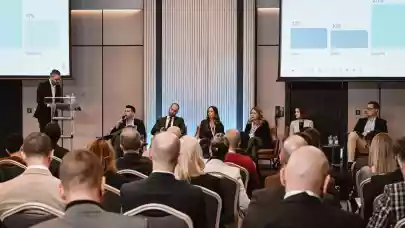
The real estate market in Southeast Europe has been influenced by various crises in recent years, leading to lower investment levels. However, in 2025, a growth in investment activities is expected as a result of lower interest rates. Investors are particularly interested in the Balkans region, especially in Serbia, with the highest demand anticipated for investments in the hotel and residential sectors, while demand for office space is somewhat lower. These are some of the conclusions drawn by participants at the 8th edition of Balkans Property Forum 2024, organized in Belgrade by Property Forum.
Predictions for 2025
According to Dr. Gábor Regos, Chief Economist at Granit Asset Management, a Hungarian asset management company, the real estate market in Southeast Europe is expected to grow in 2025, particularly in the Balkans region, with foreign investments anticipated in the hotel and housing sectors, while logistics will depend on the competitiveness of the European industry.
„The real estate market in Serbia will be boosted by the EXPO 2027, as new infrastructure, hotels, and residential buildings will need to be constructed for this three-month event. In short, the facilities important for tourism development will be built and will remain usable after the expo. Regarding apartment prices, these will still be driven by location and workforce availability, as locations in large cities are much more expensive than in smaller towns, and it is harder to attract workforce to the larger cities.“ Apartments will continue to be sold for cash and then rented out. This trend will continue, but investors will have to listen to market demands and build apartments that are more affordable and accessible to credit buyers. Gábor also reminded that national banks have contributed to controlling inflation in the US and EU, but it is important to continue in that direction, as stable political conditions are essential for a significant increase in investments.
Maja Šahbaz Marojević from EY emphasized that investors seek stability and predictability and that both geopolitical and economic stability are equally important to them. „The interest in investing in hotels is not surprising, as there is a shortage of quality supply not only in Belgrade but also in other larger cities in Serbia, while housing development has long been considered a "safe haven" for investors, so this trend will continue into the next year. However, the question arises as to whether the price growth is sustainable, she pointed out.“
Gabriela Rejes Vidrio, Head of the Real Estate Project Financing Department at NLB Commercial Bank, confirmed that foreign investors are literally "waiting in line" to invest in the Serbian market, noting that foreign investors now have more choices of banks and no longer have to "take or leave" the first offer presented to them.
Development of industrial real estate
In recent years, Serbia has positioned itself as a very attractive market for investing in industrial real estate (logistics and manufacturing), and this trend continues, with the rapid development of road infrastructure accompanying this construction. The conference also highlighted significant opportunities for growth in the construction of data centres.
„Digitalization is advancing, and the volume of data is dramatically increasing, making data centre construction a "new goldmine" for investors. Regarding other areas in the region, the dynamics also depend on whether large investors will remain "cautious" and invest in developed markets, or whether they will seek higher returns in these markets, where costs are lower, but bureaucratic problems remain a persistent issue, leaving space for corruption,“ said Mario Kijanović from SOG.
According to Petar Kolognat, Business Development Director at CTP, what makes Serbia attractive in terms of industrial real estate is its excellent geostrategic position, access to the EU market, and the availability of labor.
„CTP operates in 10 European countries, and in many of them, it is difficult to find quality land, whereas Serbia has plenty, which is one of the reasons why we are so active in the Serbian market. Industrial zones have been developed in Belgrade and Novi Sad, and we are developing industrial parks in Kragujevac, Jagodina, and Niš to be competitive in offering production spaces (factories for rent) in locations with sufficient labour force. In Sombor, we purchased over 20 hectares, with the goal of making other parts of the country more attractive. Foreign investors, especially in the automotive industry, are particularly interested in these smaller towns,“ said Petar Kolognat.
Vasilije Jauković, Principal Banker from the EBRD emphasized that Serbia is a very good market for investing in commercial real estate, with banks increasingly investing in the construction of office buildings. „We believe that Serbia, unlike some other countries in Europe, will be a very good market in the coming years when it comes to investments in commercial real estate. In 2025, we expect projects we have been working on for a while, involving the private sector, larger institutional investors, and cooperation with the Serbian government in phase two of the development of science parks,“ said Jauković.
Office space
Although the labour market changed after the COVID-19 pandemic, the work-from-home model will not persist, according to the conclusion of a panel on office space. However, it was also noted that hybrid work will continue to grow, influencing the design of future offices.
Experts believe that office spaces will be designed according to the type of work being done, with investors paying more attention to ensuring that buildings can adapt to future needs. This will result in higher rental prices for landlords and greater benefits for tenants.
„In Belgrade, there is constant growth in buildings intended for office space, which are also energy-efficient. The market is stable, and no changes are expected. We are on the right track,‘ said Danijela Nedeljković Stojakov from BDO Serbia, and reminded that remote work has opened up a new structure for “open space” office environments, designed differently to meet the needs of tenants and their business development.
Investments in the hotel sector
Investment activity in the hotel sector is significantly higher than before, as people generally love to travel, and their habits have not changed, said George Bobvos, Business Development Director at DDG Group. He noted that the biggest weakness is the lack of branded apartments, five-star hotels, and resorts that can extend the season, while a constant challenge remains how to keep the occupancy of four-star hotels and higher. However, he said that the market is moving in that direction.
„Regarding Serbia, a good investment opportunity is the upcoming EXPO 2027, as more hotels will be needed. However, it is important to think about sustainable development, to plan in advance what will happen with such capacities after the event concludes,“ said David Jenkins, Vice President of Business Development for Eastern Europe at Radisson Hotel Group, announcing the construction of another hotel of their brand in Niš.




